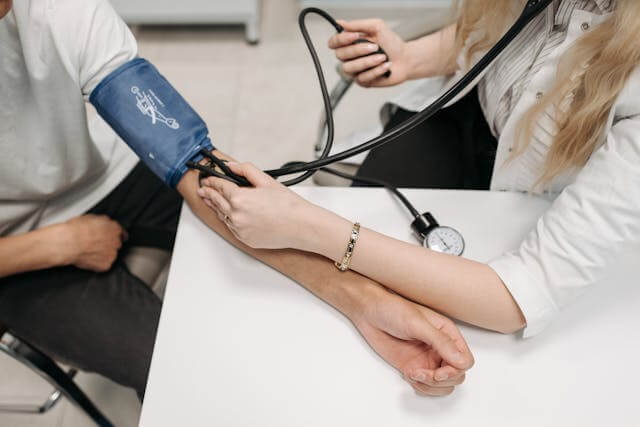Brief Overview of Hypertension (High Blood Pressure) Hypertension, commonly known as high blood pressure, is a chronic medical condition where the
Brief Overview of Hypertension (High Blood Pressure)
Hypertension, commonly known as high blood pressure, is a chronic medical condition where the blood pressure in the arteries is persistently elevated. Blood pressure is the force exerted by the blood against the walls of the arteries as the heart pumps it around the body. It is measured in millimeters of mercury (mmHg) and recorded as two numbers: systolic pressure (the pressure when the heart beats) over diastolic pressure (the pressure when the heart rests between beats). Normal blood pressure is typically around 120/80 mmHg, and hypertension is diagnosed when the reading consistently exceeds 140/90 mmHg.
Importance of Understanding and Managing Hypertension for Overall Health
Hypertension is often referred to as the “silent killer” because it frequently presents with no obvious symptoms until significant damage has occurred. If left untreated, high blood pressure can lead to severe health complications, including heart disease, stroke, kidney failure, and vision loss. Understanding and managing hypertension is crucial for maintaining overall health, reducing the risk of life-threatening conditions, and improving the quality of life.
Common Conditions and Diseases Associated with Hypertension
Hypertension is a major risk factor for several severe health conditions. Here are some of the most common ones:
1. Coronary Artery Disease (CAD)
Description: Coronary artery disease occurs when the blood vessels supplying the heart become narrowed or blocked due to the buildup of cholesterol and other materials, known as plaque.
Symptoms: Chest pain (angina), shortness of breath, and fatigue. In severe cases, it can lead to a heart attack.
2. Stroke
Description: A stroke happens when the blood supply to part of the brain is interrupted or reduced, preventing brain tissue from getting enough oxygen and nutrients.
Symptoms: Sudden numbness or weakness in the face, arm, or leg, especially on one side of the body; confusion; trouble speaking or understanding speech; difficulty seeing in one or both eyes; trouble walking; dizziness; loss of balance or coordination.
3. Chronic Kidney Disease (CKD)
Description: Chronic kidney disease is a condition characterized by a gradual loss of kidney function over time. Hypertension can damage the blood vessels and filters in the kidneys, making it difficult for them to remove waste and extra fluid from the body.
Symptoms: Fatigue, swelling in the feet and ankles, shortness of breath, and changes in urination patterns.
4. Heart Failure
Description: Heart failure occurs when the heart is unable to pump enough blood to meet the body’s needs. High blood pressure increases the heart’s workload, causing the heart muscles to thicken and weaken over time.
Symptoms: Shortness of breath, persistent coughing or wheezing, fluid retention (edema), fatigue, and a rapid or irregular heartbeat.
5. Aneurysm
Description: An aneurysm is a bulge in the wall of an artery. High blood pressure can weaken the walls of the arteries, leading to the formation of aneurysms, which can rupture and cause life-threatening internal bleeding.
Symptoms: Aneurysms often have no symptoms until they rupture. Symptoms of a ruptured aneurysm can include sudden and severe pain, low blood pressure, and loss of consciousness.
Allopathy Medicine and Uses
Allopathic medicine offers a range of treatments to manage hypertension and its associated conditions. Here are some common allopathic treatments:
1. ACE Inhibitors (e.g., Lisinopril, Enalapril)
Description: ACE inhibitors help relax blood vessels by blocking the formation of a natural chemical that narrows blood vessels.
Uses: Effective in lowering blood pressure and preventing complications such as heart failure and chronic kidney disease.
2. Beta-Blockers (e.g., Atenolol, Metoprolol)
Description: Beta-blockers reduce the heart rate and the heart’s output of blood, which lowers blood pressure.
Uses: Used for managing high blood pressure, preventing angina, and reducing the risk of recurrent heart attacks.
3. Diuretics (e.g., Hydrochlorothiazide, Furosemide)
Description: Diuretics, also known as water pills, help the kidneys remove sodium and water from the body, which reduces blood volume and lowers blood pressure.
Uses: Commonly prescribed for hypertension, heart failure, and edema.
4. Calcium Channel Blockers (e.g., Amlodipine, Diltiazem)
Description: These medications prevent calcium from entering the cells of the heart and blood vessel walls, leading to lower blood pressure.
Uses: Effective in treating high blood pressure, angina, and certain arrhythmias.
5. Angiotensin II Receptor Blockers (ARBs) (e.g., Losartan, Valsartan)
Description: ARBs block the action of angiotensin II, a chemical that narrows blood vessels.
Uses: Used to treat high blood pressure, heart failure, and chronic kidney disease.
6. Vasodilators (e.g., Hydralazine, Minoxidil)
Description: Vasodilators directly relax the muscles in the walls of the blood vessels, causing them to widen and lower blood pressure.
Uses: Prescribed for severe hypertension and heart failure.
First Aid for Hypertensive Emergencies
Hypertensive emergencies require immediate medical attention to prevent severe complications. Here are the steps to take in such situations:
Recognize the Symptoms
- Severe headache
- Shortness of breath
- Nosebleeds
- Severe anxiety
- Chest pain
- Blurred vision
- Confusion or difficulty concentrating
Immediate First Aid Steps
- Stay Calm: Keeping calm can help prevent the situation from worsening.
- Sit Down and Rest: The person should sit down and rest in a comfortable position.
- Monitor Blood Pressure: If a blood pressure monitor is available, take the reading to provide information to healthcare professionals.
- Administer Prescribed Medication: If the individual has medication prescribed for hypertensive emergencies (e.g., nifedipine or clonidine), administer it as directed.
- Avoid Stress and Stimulants: Ensure the person avoids stressors and stimulants such as caffeine and nicotine.
- Seek Emergency Medical Help: Call emergency services immediately for professional medical assistance.
Best Practices
- Keep emergency contact information readily available.
- Educate family members and close friends on how to recognize and respond to hypertensive emergencies.
Steps to Prevention
Preventing hypertension and managing it effectively can significantly reduce the risk of associated conditions. Here are some preventive measures:
Lifestyle Modifications
- Healthy Diet: Adopt a diet rich in fruits, vegetables, whole grains, and lean proteins. Reduce sodium intake and limit processed foods.
- Regular Exercise: Engage in at least 30 minutes of moderate-intensity exercise, such as brisk walking, five days a week.
- Weight Management: Maintain a healthy weight to reduce the strain on the heart and blood vessels.
- Limit Alcohol: Drink alcohol in moderation. For men, limit to two drinks per day, and for women, limit to one drink per day.
- Quit Smoking: Smoking cessation can improve overall cardiovascular health and reduce blood pressure.
Stress Management
- Relaxation Techniques: Practice relaxation techniques such as deep breathing, meditation, and yoga to manage stress.
- Adequate Sleep: Ensure 7-8 hours of quality sleep each night to support overall health.
Regular Health Check-Ups
- Monitor Blood Pressure: Regularly monitor blood pressure at home or through healthcare providers to keep track of any changes.
- Medical Reviews: Schedule regular check-ups with healthcare professionals to assess blood pressure and overall health.
Medication Adherence
- Follow Prescriptions: Take prescribed medications as directed by a healthcare provider.
- Avoid Missing Doses: Set reminders to take medications on time and avoid missing doses.
Educational Resources
- Stay Informed: Educate yourself about hypertension and its management through reliable sources.
- Support Groups: Join support groups for individuals with hypertension to share experiences and gain insights.
Conclusion
Hypertension is a significant health concern that requires careful management to prevent severe complications. Understanding the associated conditions and diseases, exploring allopathic treatments, knowing first aid for hypertensive emergencies, and adopting preventive measures are crucial steps in managing high blood pressure effectively. By staying informed and proactive, individuals can lead healthier lives and reduce the risks associated with hypertension.
Disclaimer:
The information provided in this article is for educational purposes only and is not intended as a substitute for professional medical advice, diagnosis, or treatment. Always seek the advice of your physician or other qualified health provider with any questions you may have regarding a medical condition. Do not disregard professional medical advice or delay seeking it because of something you have read in this article. If you think you may have a medical emergency, call your doctor or emergency services immediately.


